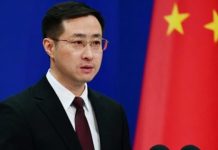-Top Industries slapped with 10% Super Tax
-PM claims govt wants to reduce burden of inflation
-PTI criticizes govt for imposing 10% Super Tax on 13 sectors
-Finance Minister windup Parliamentary discussion on Budget
-Industrialists express great resentment over imposition of Super Tax
By Anzal Amin
ISLAMABAD: Prime Minister Shehbaz Sharif on Friday announced that the government will be imposing a 10 per cent “super tax” on large-scale industries in a bid to shore up revenues for supporting the country’s poor amid rising inflation.
Industries to be taxed include Cement, Steel, Sugar, Oil and Gas, Fertilisers, LNG terminals, Textile, Banking, Automobile, Cigarettes, Beverages, Chemicals, Airlines.
High net worth individuals will also be subject to a “poverty alleviation tax”. Those whose annual income exceeds Rs150 million will be subject to 1pc tax; for Rs200 million, 2pc; Rs250 million, 3pc; and Rs300 million will be taxed 4pc of their income.
His speech triggered a nosedive at the Pakistan Stock Exchange, as its benchmark KSE-100 index saw a sharp 2,053-point drop before trading was halted. As of 12:00pm, it stood at 40,663.62, down 4.81 per cent. Finance Minister Miftah Ismail later clarified on Twitter that the “super tax” is a “one-time tax needed to curtail the previous four record budget deficits”. He elaborated further in his speech in the National Assembly, where lawmakers had gathered to conclude the budget session.
In the address Friday, the premier took the nation into confidence over what he described as “tough” budget decisions. He said that the coalition government made “courageous” decisions to protect the country from “serious dangers”.
He recalled that the government had two options when it first came to power: call fresh elections or take tough decisions and tackle the sinking economy. “It would have been very easy to leave the public in crisis and become silent spectators like others.” And despite the challenges, the prime minister pointed out, the government chose the latter.
He said history had witnessed that in difficult times, it was the poor who always made sacrifices. “Today, it is time for the affluent citizens to do their part. It is their turn to show selflessness. And I am confident that they will contribute fully to play their part.”
He said the institutions whose job was to collect taxes should take from the rich and give to the poor. He, however, lamented that the “big ones” evade paying taxes.
The prime minister said it was the collective responsibility of the state — including the PM — that tax money went to the national treasury. “We have been unsuccessful in this so far,” he added.
PM Shehbaz said: “It is never too late. Right after the budget [is passed], teams have been formed to go all out to collect taxes. Assistance will be sought from all constitutional institutions and we will employ modern technology and digital tools [for the purpose].
PM Shehbaz said the steps taken in the budget were designed to ease the burden on the poor. “As for the classes who are blessed, today, this nation is demanding of them to also work hard, to come forward and to make Pakistan prosperous and progressive,” he added.
The premier called on the wealthy to “distribute” some of their wealth and “relive the memory of Ansar-i-Madina”. “This is your responsibility, and the nation demands it of you,” he said.
He said it was his belief that the steps that were taken now would not only add to Pakistan’s treasury but would also bring ease to the poor and make Pakistan economically self-reliant.
The prime minister said by taking from those “who Allah has blessed”, education, health, roads, IT development could be buttressed. “To further nurture the nation, resources are needed,” PM Shehbaz added.
He added that if the amount was not collected for the country’s needs, “we will have to take loans”.
Referring to his predecessor Imran Khan’s “shackles of slavery” remarks, PM Shehbaz said economic stability and economic freedom were the only true ways the “shackles of slavery would be broken”.
“This is what we call self-reliance, without which no nation can have independence,” he added. He lamented that the country was a nuclear power but economically “we are still infirm and weak”.
PM Shehbaz made another appeal for a “grand national dialogue” and his charter of economy. He said if the country did not bicker among themselves and “fight to end poverty, to end a life of debt, to stabilise Pakistan’s economy, the country wouldn’t be in the position it is in.
“But it is never too late. Today we have to demolish the walls of poverty, unemployment and hatred. We have to give birth to flowers of love and end thorns. This is only possible through a grand national dialogue and charter of economy.
“When the nation is united and will stick to its mission, whatever govt comes and goes, Pakistan’s conditions will change soon.”
Meanwhile, Head of Prime Minister’s Strategic Reforms, Salman Sufi, said “the notion that somehow this super tax will be transferred to the citizens is flawed”.
“We have robust mechanics in place to ensure it doesn’t happen and it’s a onetime tax on profits. Plus, we have full confidence in our privileged segment that they will step up and help Pakistan steer in the right direction,” Sufi said in a statement.
Meanwhile, PTI Secretary General Asad Umar on Friday excoriated the coalition government for imposing a “super tax” on large-scale industries, saying that the measure would “rattle the economy”, increase unemployment and inflation, shoot up imports and push Pakistan further into economic crisis.
“This is a huge blow to the growing industries,” he said at a press conference in Islamabad.
In his presser Friday, Umar said: “This [super tax] is an attack on those sectors of the economy that have the potential of growth […] that can increase production and livelihood […] and this is the reason why the market lost 2,000 points during Shehbaz Sharif’s speech.
“You can clearly figure out from this how dangerous and fatal the budget is for the economy,” the former federal minister pointed out.
For the past 20 years, he continued, Pakistan had a policy of gradually decreasing taxes on industries. “But they have ruined it all now.”
He further stated that even now, despite increasing prices of every commodity — diesel, petrol, gas, and food items — the PM said the deal with the International Monetary Fund (IMF) will only be signed if the fund doesn’t make more demands.
“This is a joke with the public,” he said. “And then you ask people to be thankful? Mian sahab, you had a choice between protecting the public and hiding your corruption and you have chosen the latter,” the former minister added.
He also claimed that the government didn’t care about the public because it knew the public never chose it. “All they care about are the people who brought them. How will America be happy? Will it be happy by recognising Israel? By extending ties with India or by giving bases [to the US]?”
Meanwhile, countering the prime minister’s remarks on PTI leading the country towards a default, Umar said that when the Imran-led government was “ousted”, the foreign exchange reserves in the State Bank of Pakistan (SBP) were $16.4 billion.
“In the last three months, they have come down exactly by half. So, PM sahab, it was you who has driven the country to default, not us.”
Meanwhile, Finance Minister Miftah Ismail Friday said the government has decided to levy a super tax on the affluent class to reduce the budget deficit in order to end reliance on foreign assistance and take the country towards economic sovereignty.
Winding up discussion on the budget for the next fiscal year, he said individuals and companies earning Rs150 million will have to pay one per cent additional tax, two per cent additional tax on 200 million rupees income, three per cent on 250 million rupees income and four per cent additional tax on 300 million rupees income. He also added that this tax will be for a period of one year.
The minister added that thirteen high-earning sectors including oil and gas, cigarettes, cement, and LNG terminals have also been identified for the imposition of a 10 per cent super tax on income of Rs300 million. He clarified that this will be a one-time tax.
Miftah said that there are nine million retail shops and the government has decided to bring 2.5 million of them in the tax net and a fixed tax will be imposed on them.
He further said that only 22 gold shops out of 30,000 are registered. A fixed tax will be levied on gold shops measuring up to three hundred square feet whilst sales tax on big jewellery shops has been reduced from 17 to three per cent.
The finance minister further said withholding tax on the sale of jewellery has been reduced to one per cent from the current four per cent. He said a fixed tax will also be imposed on car dealers, restaurants and those constructing houses. Miftah add that the tax has been imposed on income and not consumption and therefore, these measures will not cause inflation.
After incorporating various suggestions and measures, the tax revenue target has increased to Rs7,470 billion for the next fiscal year, said Miftah , adding that Rs4,373 billion will be distributed to provinces as their share.
“The government has tried to reduce the burden on the weak segments of the society,” he said while explaining that sugar, flour and ghee will be provided to the people at subsidized rates throughout the year at Utility Stores. He informed the House that one million people have so far registered to avail Sasta Petrol and Sasta Diesel scheme.
The minister also announced incentives for different sectors. He said the condition of withholding tax and statements for IT companies with a revenue of less than Rs80 million will be exempted. He said a tax being charged from Oil Marketing Companies (OMCs) at the rate of 0.75 per cent has been brought back to 0.5 per cent. Overseas Pakistanis having NICOP cards will be included in the active taxpayers’ list as well. While income on the plots of the families of martyrs and war-injured has been exempted from tax. Relief has also been given to leather and surgical goods.
Terming the budget as “the most pro-farmer budget ever presented”, Miftah expressed optimism that the budget will accrue long-term benefits for the country and help bolster agricultural products, besides achieving self-sufficiency in edible oil, and wheat and other crops.




